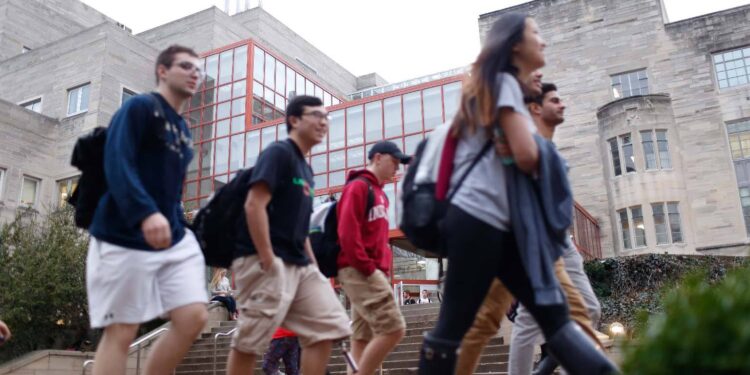By Aaron Miller-
A U.S judge on Sunday has preliminarily upheld Indiana University’s policy mandating students to receive Covid-19 vaccinations before returning to campus for the fall semester.
The judge ruled on a legal suit against University of Illinois policy issued a mandatory policy requiring students who wished to return to classes in the fall to be fully vaccinated by August 15 or when you return to campus after August 1, whichever is earlier.
The policy has angered a number of pupils from the University, who view the system as trying to force students to be vaccinated, instead of making it voluntary/ Over 500 colleges and universities have mandated the COVID-19 vaccine, and Leichty’s ruling appears to be the first in a case challenging such a policy.
The policy went as far as defining A person to be considered fully vaccinated two weeks after having all doses of a vaccine (2 doses for Pfizer, Moderna; 1 dose for Johnson & Johnson)”.
The universities policy says that students and staff must be fully vaccinated against COVID-19, unless they qualify for a medical, religious or ethical exemption, or unless a student is attending a fully online program. Students who qualify for an exemption will need to take extra precautionary measures on campus by wearing masks, taking additional coronavirus tests, and either heading home or quarantining in the case of an outbreak.
As a result of the policy, eight students sued the school, asking for preliminary injunction to halt the university’s policy. In the complaint, they argued that the rules trample on their rights under the 14th Amendment, “which includes rights of personal autonomy and bodily integrity, and the right to reject medical treatment.”
The students, represented by the Bopp Law Firm in Terre Haute, Ind., expressed other reasons for opposing the mandate, including the risk of developing serious symptoms based on their age, and the unknown long-term effects of the vaccine. (The Centers for Disease Control and Prevention has said serious side effects “are extremely unlike
“Recognizing the students’ significant liberty to refuse unwanted medical treatment, the Fourteenth Amendment permits Indiana University to pursue a reasonable and due process of vaccination in the legitimate interest of public health for its students, faculty, and staff,” Judge Damon Leichty wrote in the 101-page ruling.
“Today, on this preliminary record, the university has done so for its campus communities.”
The part of the 14th Amendment cited in Leichty’s ruling says no state may deprive any person of life, liberty, or property, without due process of law.
“A ruling from the federal court has affirmed Indiana University’s COVID-19 vaccination plan designed for the health and well-being of our students, faculty and staff,” IU said. “We appreciate the quick and thorough ruling which allows us to focus on a full and safe return. We look forward to welcoming everyone to our campuses for the fall semester.”
James Bopp Jr., the lead attorney for the plaintiffs and the director of litigation for America’s Frontline Doctors, said they planned to appeal.
Appeal
“Today’s ruling does not end the students’ fight — we plan to immediately appeal the judge’s decision,” Bopp said in a statement. “In addition, we plan on asking the judge to put a hold on IU’s Mandate pending that appeal. We are confident the court of appeals will agree that the Mandate should be put on hold.”
The US Supreme Court has long held that states and public schools can mandate vaccinations. Judge Leichty’s ruling pointed out the state of Indiana’s long-standing requirements for other vaccinations prior to going to school.
“Indiana requires all public university students to be vaccinated for diphtheria, tetanus, measles, mumps, rubella, and meningococcal disease before attending school. All but one of these vaccinations have been required since 1993,” the ruling said.
In denying the motion, the ruling also points out the university allows for certain exemptions, including religious and medical reasons, and said that students therefore have “multiple choices, not just forced vaccination.”
In late April, the state of Indiana passed a law banning state or local units from requiring an immunization passport, so any vaccine requirement must be based on an honor system.
In the complaint, the students argued that the rules trample on their rights under the 14th Amendment, “which includes rights of personal autonomy and bodily integrity, and the right to reject medical treatment.” The students, represented by the Bopp Law Firm in Terre Haute, Ind., had a range of reasons for opposing the mandate, including the relatively low risk of developing serious symptoms based on their age and the unknown long-term effects of the vaccine. (The Centers for Disease Control and Prevention has said serious side effects “are extremely unlikely.”)
In the complaint, multiple students said they have religious reasons for opposing masks, which they’d need to wear if they qualified for an exemption from the vaccine requirement. In response, Leichty wrote that while the right to exercise religion is fundamental, the university’s vaccine mandate applies the same way to all students: “One may well applaud the university for going beyond what the constitution requires: courts have consistently held that schools that provided a religious exemption from mandatory vaccination requirements did so above and beyond that mandated by the Constitution.”
Indiana University spokesman Chuck Carney said, “We appreciate the quick and thorough ruling which allows us to focus on a full and safe return. We look forward to welcoming everyone to our campuses for the fall semester.”
Image:Student central.university.edu

